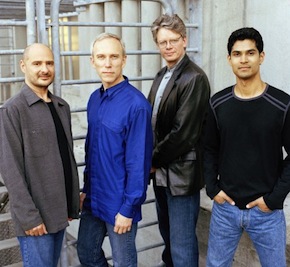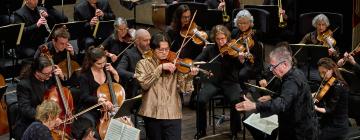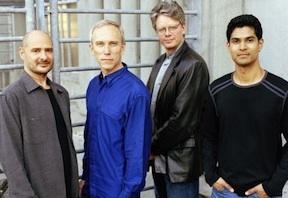
Two years ago, the Smithsonian Folkways label and the Aga Khan Music Initiative issued Rainbow, the eighth in their series showcasing the music of Central Asia. This audio-and-DVD release recorded the meeting of a dynamic pair of father-and-daughter singers from Azerbaijan, Alim and Fargana Qasimov, accompanied by an ensemble of ethnic instruments, with the strings of the San Francisco–based Kronos Quartet. For most listeners, it was their first experience of a passionate, powerful song form, decorated with microtonal ornamentations and underscored by entrancing instrumental tones and rhythms. Next month, that fascinating collaboration will be witnessed live by audiences at the UC Berkeley on Feb. 5 and Stanford campuses (on Feb. 12). Quartet founder David Harrington was on tour with Kronos in Europe when he spoke with SFCV about the Qasimovs and what else will be offered at the local concerts.
Has Europe been hearing what we’ll hear here?
No, every show on this whole tour is totally different. We have 50-some pieces on the tour with us. I just got back from a very intensive rehearsal for a world premiere we’re going to do in Paris, by the Iranian composer Alireza Farhang, that involves a lot of multiphonics [multiple notes sounding from a single instrument] and electronics. Later, in London, we’re premiering Valentin Silvestrov’s Third Quartet. He’s from the Ukraine.
On the Rainbow DVD, you talked about when you first heard the music of Alim Qasimov. What were you feeling?
Alim’s voice is one of the wonders of the natural world.
One song on Rainbow, "Getme, Getme", was also sung by Alim and his daughter Fargana on your Floodplain compilation, which I reviewed for SFCV three years ago.
That was from the live performance of the world premiere, at the Barbican Centre.
To my ears, it was irresistibly intense. You couldn’t get out of the way of it, and you wouldn’t want to.
Right. It’s very encompassing and gripping. When Alim goes up for those high notes, it’s just bloodcurdling. Fargana is unbelievable, as well, and all the musicians in Alim’s ensemble are just some of the best I’ve ever heard. Fargana has studied with her father for years, and now he’s teaching his grandkids, her children.
All the musicians in Alim’s ensemble are just some of the best I’ve ever heard.
What’s it like for your ensemble to work with his?
Musicians all over the world face the same problems: How do you make a great note? Can you play together and in tune? But the timbre of their different instruments I find really wonderful. The balaban, which is a very rich, double-reed clarinet sound, it’s so beautiful. And the sounds we hear around us invite us to create new sounds on our instruments. Hopefully, some of that is happening with them, as well. You feel like your vocabulary is getting larger.
Featured Video
I gather that the songs on Rainbow and that you’ll be doing here with the Qasimovs are chosen from Alim’s favorites.
We fashioned a set of them that felt right for us. Some are love songs from Azari films, but what they’ve done is to add the tradition of [modal, classical] mugam to those songs. My impression is that everyone in Azerbaijan knows these songs, but they don’t know the connection to mugam, so it’s pushing the music into another area.
Will we find out that Azeri [Azerbaijani] music isn’t just one thing?
Exactly. There are elements of Turkish music, relationships to Iranian and even Indian music, so there’s a real sense of the depth of the tradition. Plus some of the melodies are clearly love songs.
Has “Getme, Getme” [translated as “Don’t Leave, Don’t Leave”] become something of a hit, since its appearance on the two albums?
The way Alim and Fargana sing all the songs is so beautiful, but there’s something about that one that just gets me every time.
Have you picked up much about the structure and history of Azeri music?
A certain amount you pick up just being around it. I’m sure there are things we’re intuiting now that we never thought we’d have any knowledge of. Also, there’s a certain amount of improvisation that we do occasionally.
When the Qasimovs sing “Getme, Getme,” it “gets you” even if you don’t know Azeri.
Tell me how that works with the Qasimov Ensemble.
For example, there’s a beautiful [vocal] solo in “Getme, Getme” that Fargana has, and I’m improvising my line beneath her. It’s different every time. Sometimes I start with what is on the page, but it always moves off that. Everybody in Kronos has certain moments like that, where we might be playing a drone note, but then adding other elements at the same time. Sometimes it’s almost conversational with the other members of Alim’s ensemble.
Do you have a sense of your impact on the Qasimov Ensemble?
They always check out the new pieces that we bring to the shows, and they give us recordings they’ve done individually, so there’s a lot of back-and-forth.
What other stuff will you be bringing to the Berkeley and Stanford shows?
We want to create two different ways of thinking about Kronos’ work, and part of it is to delight the members of the Qasimov Ensemble. They might have heard Oasis, by Franghiz Ali-Zadeh [an Azeri composer trained in Western classical music], before, but the other music they haven’t heard. Also, we want our audience to feel like they could come to both these shows, because the music will sound different in each setting. There’ll be a difference hearing the Qasimov Ensemble after listening to Steve Reich’s WTC 9/11, as opposed to after Oasis. I, for one, can’t wait to be there to hear it, just the way that total difference of musical approach is going to affect the entire concert.
Do talk about the rest of the programs.
Bryce Dessner’s piece was written as a present for Larry Neff, who’s our lighting man and production manager, for his 50th birthday and his 25th year with Kronos. We just played it in Gdańsk [Poland] two nights ago, and it’s incredibly beautiful; there’s a lot of light in this piece. It’s called Tenebre, and it’ll open the Stanford concert. Michael Gordon’s Clouded Yellow, which will be a Bay Area premiere at Berkeley, is totally joyous.
You’ve got another Bay Area premiere, with Philip Glass’ arrangement of Bob Dylan’s Don’t Think Twice, It’s All Right. Will that tickle or surprise Dylan fans?
It should do both! And it’s our contribution to the four-CD Songs of Bob Dylan, for Amnesty International [released Jan. 24]. We did a little additional orchestrating with Van-Anh Vo, a musician/composer originally from Vietnam who now lives in Fremont.
At Stanford, you’ll have Reich’s WTC 9/11, which I gather has staying power beyond the 10th anniversary of the World Trade Center tragedy.
We just did it the other night in Gdańsk. We ended the program with it, and, a couple of days before, we opened a program in Novi Sad, Serbia, with it.
Is it evocative, that far from Manhattan?
No question about it. It’s almost as though the subtleties of [spoken English] language don’t even matter, because the sonic realm and the meaning of the words are very clear.
Like when the Qasimovs sing “Getme, Getme,” I guess. It “gets you” even if you don’t know Azeri.

